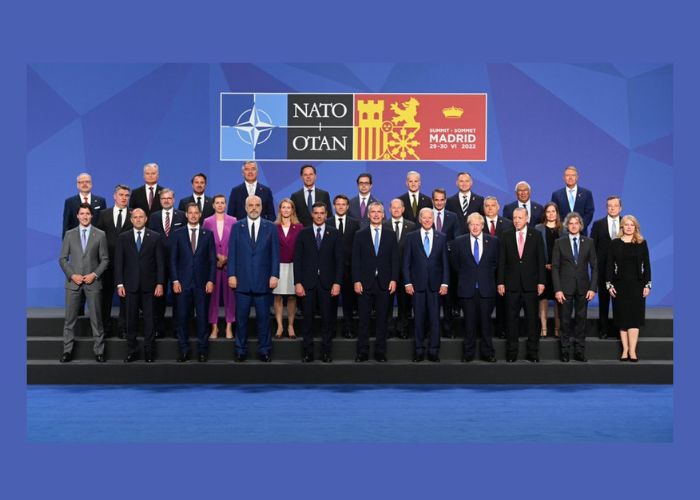A protocol error with the Spanish flag is the anecdote that marked the morning of the first day of the NATO Summit in Madrid. Spanish Prime Minister Pedro Sánchez addressed the leaders of the member countries. However, the Spanish flag was hoisted upside down during the opening of the meeting.
After the traditional group photo, the Alliance presidents and prime ministers made their way to the plenary hall. At this point, Alliance leader Jens Stoltenberg made way for Sánchez to deliver his first words to the leaders. At that moment, the Spanish flag was seen hanging upside down on the table in front of the Prime Minister. NATO spokesperson Oana Lungescu apologised to the host country on Twitter and assured that the mistake was immediately corrected. The message was accompanied by a photo showing Sánchez with the flag in the correct position.
Not the first time
The incident is reminiscent of what happened during Sánchez’s visit to Rabat during a dinner with Morocco’s King Mohamed VI. Then, the Spanish flag was also seen with its coat of arms upside down. However, this was later attributed to an unintentional protocol error.
War
Sánchez stated the NATO summit that officially started on Wednesday in Madrid will be marked by the war in Ukraine. The summit will be a ‘historic turning point’ as a result of decisions taken during the 2-day meeting.
There will also be a clear message to Vladimir Putin. His invasion of Ukraine on February 24 broke the rules of the current international order. It provoked the first confrontation between two conventional armies since World War II.
‘The war in Ukraine is an attack on a rules-based international order. The principles that guarantee peace between nations, such as sovereignty and territorial integrity, have been dramatically violated. That is why, together, we are sending a very strong, very clear message to Putin here today in Madrid; you are not going to win,’ said Sánchez, who considers it necessary to ‘provide allies with the right tools to respond forcefully to the challenges of our time’.
Uncertain future
Madrid will prepare the alliance for the ‘uncertain’ future ahead. ‘We are living in turbulent times and we will have to face the future with determination and respond to new competitors and the new emergence of others,’ Sánchez told those present. ‘We also need to better prepare NATO to face the most worrying security threat to Europe since the Second World War, and decide on the development of new tools to innovate,
What course will NATO take?
The allies will also have to answer the question; what kind of NATO do we want in the coming years to ensure peace and stability? Their answer, according to Sánchez, will depend on the diagnosis of the current geopolitical context and on the forecasts of what lies ahead in the near future.
‘There is competition between the great powers, which is not new, but what is characteristic of this era is the shift in the balance of power due to the relative decline of some nations and the strengthening of the influence of others. This is creating new frictions. But what worries us is that the nature of the balance achieved over the past seven decades is being questioned,’ the Prime Minister said.
According to him, we cannot tolerate countries violating the system of international rules, as he said has happened in Ukraine. ‘The international order based on norms and rules will prevail. Ukraine and peace will prevail,’ he warned.
Change in Europe
He also recalled that in little more than four months, the conflict has brought about a “drastic change” in Europe: Sweden and Finland have renounced their historical neutrality, Denmark has abandoned its opt-out clause and Germany has abandoned its traditional decision to cut military spending. According to Sánchez, many countries recognise the need to increase defence spending and will do so as soon as possible. The goal is peace, stability, security and safety, and to achieve this, allies must work together to have the necessary tools. ‘The war in Ukraine has taught us that nothing can be taken for granted and that these values must be defended,’ Sánchez said.
Green light for Sweden and Finland
Sweden and Finland decided last month that they want to join NATO as soon as possible. Since the Russian invasion of Ukraine, they believe they are safer within the Western military alliance than with a neutral position outside it. But they unexpectedly encountered resistance from Turkey. The three countries have signed a joint memorandum in which they declare to guarantee each other’s security. That ‘takes away Turkey’s concerns’, says NATO Secretary-General Jens Stoltenberg. According to Sánchez, the fact that Sweden and Finland gave up their traditional position of neutrality also makes the Madrid Summit memorable.


